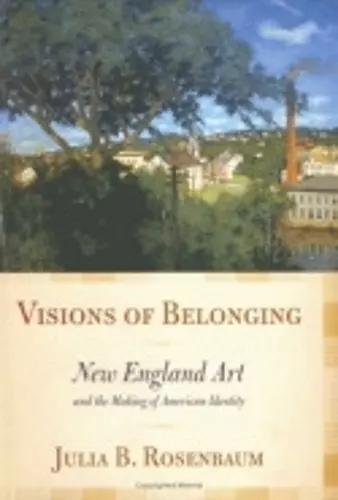Visions of Belonging
New England Art and the Making of American Identity
Format:Hardback
Publisher:Cornell University Press
Published:15th Dec '06
Currently unavailable, and unfortunately no date known when it will be back

In the late nineteenth and early twentieth centuries depictions of New England flooded the American art scene. Childe Hassam, Willard Metcalf, Theodore Robinson, and Julian Weir, and other well-known artists produced images of quaint villages, agricultural labor, scenic rural churches, and the distinctive New England landscape. Julia B. Rosenbaum asks why and how a range of artists—including Impressionist and Modernist painters and sculptors—and exhibitors fashioned this particular vision of New England in their work.
Against the backdrop of industrialization, immigration, and persistent post-Civil War sectionalism, many Americans yearned for national unity and identity. As Rosenbaum finds, New England emerged as symbolic of cultural and spiritual achievement and democratic values that served as an example for the nation. By addressing the struggles for national unity, the book offers a new interpretation of turn-of-the-century American art. Ultimately, Visions of Belonging demonstrates how the local became so important to the national; how art was crucial to the formation of national identity; and how internal nation building takes place within the realm of culture, as well as politics. And even as later artists, such as Georgia O'Keeffe, challenged New England's cultural hegemony, the appeal of linking regional identity to national ideals continued in distinctive ways.
Beautifully illustrated with color plates and almost sixty halftones, Visions of Belonging explores the interplay between art objects and the shaping of loyalties and identities in a formative phase of American culture. It will appeal not only to art historians but also to anyone with an interest in nineteenth-century studies, the Gilded Age and Progressive Era, American studies, New England history and culture, and American cultural and intellectual history.
"Faced with rapid industrialization, burgeoning social conflict, and massive immigration, late-nineteenth-century New England elites embarked upon the construction of a national identity rooted in the imagined past of their own region. Julia Rosenbaum brilliantly charts how painters and sculptors, writers and intellectuals, economic elites and political players worked to define this identity, and how their imperial project eventually faltered on the shoals of the nation's emerging celebration of regional diversity. By mapping the changing relationship between regional and national identities at the moment of the emergence of modern America, Rosenbaum's beautifully written book is a major contribution to the history of American nationalism." -- Sven Beckert, Harvard University
"Visions of Belonging is a well-written, well-organized, and carefully researched book in which Julia B. Rosenbaum convincingly argues that Americans at the turn of the nineteenth century searched for a national identity through regional affiliation, especially New England. Rosenbaum argues that the American Impressionists celebrated landscape art not for its national identity but for its celebration of rural New England-its identification with place, people, and history." -- Vivien Green Fryd, Vanderbilt University
ISBN: 9780801444708
Dimensions: unknown
Weight: 907g
216 pages